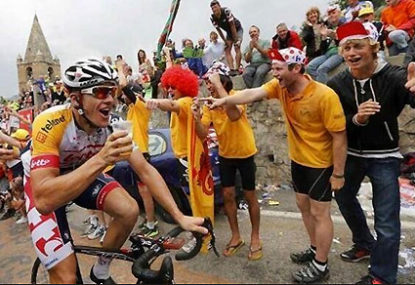'I've just won a stage of the Tour de France, mate!': Hindley grabs yellow jersey as Aussie blows Tour apart
Australia's Jai Hindley has said he is "lost for words" after a shock stage victory at the Tour de France earned him the leader's…

While one of the best ways for a cyclist to maximise their power output is by losing weight, those scrawny little rakes making their way across France consume a huge amount of calories every day.
This year’s Tour de France covers 3358 kilometres over 21 stages, meaning the peloton ride an average of almost 160 kilometres a day.
This would be a strenuous enough to attempt at your own pace, but when racing this distance against the world’s fastest, fittest cyclists, you are going to burn through an insane amount of energy.
As such, riders need to ingest a good 8000 calories per day to maintain their energy levels – that’s the equivalent of almost 14 Big Macs.
Obviously it’s not a bag of takeaway the team soigneurs assistants are handing out at feeding points throughout the race, so how do you get the necessary nutrition to finish each gruelling day?
These days breakfast is a big, carb-based meal, with riders eating a bowl of pasta, porridge, possibly an omelette, fruit and nuts. It’s a stark difference to the days of old, when the common thought was that the best way to get a ‘strong’ start to the day was by eating steak.
With most stages starting around midday, there is a significant gap between breakfast and the race rolling out, so a snack of a cereal bar and some fruit juice is taken on board, generally during the bus ride out.
During the race itself, convenience is key in staying fuelled up, so the majority of calories are taken on-board via energy bars, gels and isotonic drinks. Between these energy drinks – some containing caffeine to help stay alert – a rider may consume as much as 20 bottles of drink per day.
But a belly full of liquid isn’t going to get you through, so a few sandwiches will also be consumed over the day, and possibly even a small piece of cake.
Regardless of the power gels, bars, sandwiches and sports drinks consumed, substantially more calories are burned on a day in the bike, and so with the race done the eating continues.
A high-protein energy shake is the first order after a stage, before heading back to the hotel for a post-race snack before dinner.
Three weeks of pasta day and night would get seriously boring, so most teams have a chef as part of the support staff whose job is to ensure their guys are getting the necessary nutrients but also a bit of variety.
While a small glass of champagne might be consumed when celebrating a team member’s stage win, drinking is obviously a seriously bad idea while in the middle of a Grand Tour. This, again, makes for a dramatic change from the Tours of yore, when riders would neck bottles of beer and even shots of brandy or whisky in an effort to numb the pain of riding to the top of France’s tallest mountains.
It’ll be no surprise that the end of a day, all a cyclist wants to do is climb into bed and crash. And while a bite of supper may seem like the last thing you’d want after a day like that, having a bit of food in the belly helps fuel the body as it sets about repairing and restoring the rider’s ruined body while he drifts off.
Sleep is an aspect of sport performance that is starting to gain a real focus – some football teams even have sleep pods for their players to get rest between morning and afternoon training sessions – and getting a good night’s rest is crucial.
In an effort to aid this, Team Sky took an RV to this year’s Giro d’Italia to act as Richie Porte’s semi-permanent hotel room. It meant he wasn’t sleeping in an unfamiliar bed each night, and didn’t need to wake up and repack his bags every morning.
Sky Principal Dave Brailsford allowed journalists to take a brief tour of the RV during the Giro, but was reportedly extremely strict about anyone who entered using anti-bacterial gel on their hands before getting on-board. His reasoning was simple – pushing your body to its limit every day for three weeks (even with two days of respite offered via rest days) can significantly weaken the body’s immune system. And, as Porte discovered last year, you can’t win the Tour when suffering from pneumonia.
Sky intended to bring the RV to the Tour, this time for their leader Chris Froome to use, but the UCI found that it gave Froome an unfair advantage over his rivals – such is the emphasis now placed on a good night’s sleep for performance.
It’s the amazing thing about a three-week race – there may only be a few small moments where you can truly win the race, but there are so many ways you can lose it. Not eating enough, getting sick, or failing to get a good night’s sleep can completely derail whatever hope you had of victory.